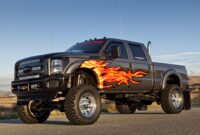Natural Gas Trucks For Sale: A Comprehensive Buyer’s Guide sale.truckstrend.com
In an era defined by fluctuating fuel prices and an urgent global call for sustainability, businesses and individuals are increasingly seeking viable alternatives to traditional diesel-powered vehicles. Among the most compelling options emerging in the commercial sector are natural gas trucks. These vehicles offer a unique blend of economic benefits, environmental responsibility, and reliable performance, making "Natural Gas Trucks For Sale" a search query of growing importance for forward-thinking fleet operators and owner-operators alike.
This comprehensive guide delves into the world of natural gas trucks, exploring their core characteristics, myriad benefits, essential considerations for purchase, and practical advice for navigating the market. Whether you’re looking to reduce your carbon footprint, stabilize your fuel costs, or simply understand the landscape of alternative fuel vehicles, this article aims to equip you with the knowledge needed to make informed decisions.
Natural Gas Trucks For Sale: A Comprehensive Buyer’s Guide
Understanding Natural Gas Trucks: CNG vs. LNG
Natural gas trucks operate by combusting natural gas in their engines, much like gasoline or diesel engines. However, the natural gas is stored in one of two forms: Compressed Natural Gas (CNG) or Liquefied Natural Gas (LNG). Understanding the distinction between these two is fundamental to choosing the right natural gas truck for your operations.
-
Compressed Natural Gas (CNG): CNG is natural gas stored at high pressure (typically 3,000 to 3,600 pounds per square inch, or psi) in strong, lightweight composite cylinders. It’s the most common form for natural gas vehicles, particularly for medium-duty trucks and heavy-duty trucks engaged in predictable, shorter-range routes like refuse collection, urban delivery, and transit operations. CNG tanks offer a good balance of capacity and space efficiency for these applications, and fueling is relatively quick and straightforward.

Liquefied Natural Gas (LNG): LNG is natural gas that has been cooled to approximately -260°F (-162°C), at which point it becomes a cryogenic liquid. This liquefaction process significantly reduces its volume, allowing for a much higher energy density compared to CNG. As a result, LNG is primarily used in heavy-duty, long-haul trucking applications where greater range is required, as the tanks can hold more energy in a smaller footprint than CNG tanks. However, LNG requires specialized cryogenic storage tanks and fueling infrastructure to maintain its extremely low temperature.
Both CNG and LNG trucks utilize dedicated natural gas engines, which are inherently cleaner-burning than diesel engines, leading to lower emissions and often simpler after-treatment systems.

The Unmistakable Benefits of Choosing Natural Gas Trucks
The decision to invest in natural gas trucks is often driven by a combination of compelling advantages that extend beyond mere compliance.
-
Economic Advantages:

- Lower and More Stable Fuel Costs: Historically, natural gas prices have been more stable and often significantly lower than diesel prices, offering substantial savings on operating expenses over the lifespan of the vehicle. This predictability can greatly assist in budgeting and cost management for fleets.
- Government Incentives and Grants: Many governments at federal, state, and local levels offer tax credits, grants, and rebates for purchasing natural gas vehicles and developing fueling infrastructure. These incentives can significantly offset the initial higher purchase price, making the total cost of ownership (TCO) competitive with, or even superior to, diesel alternatives.
- Reduced Maintenance Costs: Natural gas burns cleaner than diesel, leading to less carbon buildup and wear on engine components. This can result in extended oil change intervals, reduced need for costly diesel particulate filters (DPFs) and diesel exhaust fluid (DEF) systems, and overall lower engine maintenance requirements.
-
Environmental Impact:
- Lower Emissions: Natural gas vehicles produce significantly fewer greenhouse gas emissions (like CO2) and criteria pollutants (like NOx, CO, and particulate matter) compared to diesel engines. Using renewable natural gas (RNG), derived from organic waste, can even make the vehicles carbon-negative on a lifecycle basis.
- Reduced Noise Pollution: Natural gas engines typically operate quieter than their diesel counterparts, which is a significant benefit for urban operations, late-night deliveries, and community relations.
-
Operational Benefits:
- Reliable Performance: Modern natural gas engines deliver comparable power and torque to their diesel equivalents, ensuring that performance is not sacrificed for environmental or economic gains.
- Positive Public Image: Operating a fleet of natural gas trucks demonstrates a commitment to sustainability and corporate social responsibility, which can enhance brand reputation and appeal to environmentally conscious customers.
Types of Natural Gas Trucks Available for Sale
The market for natural gas trucks has matured, offering a diverse range of vehicles across various classes and applications.
-
By Vehicle Class:
- Medium-Duty Trucks (Class 4-7): These include box trucks, delivery vans, utility trucks, and smaller vocational vehicles. They are excellent candidates for CNG, especially for last-mile delivery and regional distribution routes where consistent fueling infrastructure is available.
- Heavy-Duty Trucks (Class 8): This category encompasses tractor-trailers, refuse trucks, dump trucks, and other large vocational vehicles. Both CNG and LNG options are prevalent here, depending on the required range and operational demands.
-
By Application:
- Refuse and Waste Management Trucks: Often equipped with CNG systems, these are one of the most common natural gas truck applications due to their predictable routes, high idle times, and the availability of centralized fueling at depots.
- Tractor-Trailers: Both day cab and some sleeper cab configurations are available in natural gas. LNG is often preferred for longer hauls due to its greater energy density, while high-capacity CNG systems are suitable for regional freight.
- Dump Trucks and Construction Vehicles: These vocational trucks are increasingly available with natural gas powertrains, particularly for projects within a reasonable range of fueling stations.
- Delivery and Utility Fleets: Companies like UPS, Ryder, and numerous utility providers have integrated natural gas vehicles into their fleets for urban and regional delivery routes.
Crucial Considerations Before Your Purchase
While the benefits are clear, purchasing a natural gas truck requires careful planning and consideration to ensure a successful transition.
- Fueling Infrastructure: This is arguably the most critical factor. Assess the availability of public natural gas fueling stations along your planned routes. For larger fleets, investing in a private, on-site fueling station (CNG or LNG) might be more cost-effective and convenient in the long run, but it represents a significant upfront investment.
- Upfront Cost: Natural gas trucks typically have a higher initial purchase price than comparable diesel models, largely due to the specialized fuel storage tanks and engine components. However, this cost can often be offset by fuel savings and available incentives over the vehicle’s lifespan.
- Maintenance & Servicing: While natural gas engines can have lower overall maintenance costs, they do require specialized technicians and diagnostic equipment. Ensure that authorized service centers are available within your operational area, or plan for in-house training for your mechanics.
- Range and Route Planning: Understand the realistic range of the natural gas truck you are considering, which varies significantly between CNG and LNG models and tank capacities. Match this range to your operational routes to avoid "range anxiety" and ensure efficient fueling stops.
- Resale Value: The used natural gas truck market is still evolving. While demand is growing, ensure you understand the potential resale value and how it might compare to a diesel truck in your region.
- Driver Training: Drivers will need training on safe fueling procedures, understanding the dashboard indicators specific to natural gas systems, and recognizing the unique characteristics of operating these vehicles.
Finding Natural Gas Trucks For Sale: Your Buying Journey
The market for natural gas trucks, both new and used, is expanding. Here’s where to begin your search:
- New Trucks:
- OEM Dealerships: Major truck manufacturers like Freightliner, Volvo, Kenworth, Peterbilt, Mack, and Navistar (International) offer natural gas models. Visiting their authorized dealerships is the primary way to purchase new natural gas trucks. They can also provide information on warranties, service plans, and financing.
- Used Trucks:
- Specialized Used Truck Dealerships: Some dealerships specialize in alternative fuel vehicles, including natural gas trucks. They often have a curated inventory and expertise.
- Online Marketplaces: Websites like TruckPaper.com, CommercialTruckTrader.com, Ritchie Bros. Auctioneers (for auctions), and even general sites like eBay Motors have dedicated sections for commercial trucks, where you can filter for natural gas options.
- Fleet Liquidations/Auctions: Companies upgrading their fleets or liquidating assets often sell their natural gas trucks through auctions or direct sales. These can be excellent opportunities to find well-maintained vehicles at competitive prices.
- Direct from Fleets: Some large fleets that have adopted natural gas technology may sell their older models directly. Networking within the industry or checking their websites can sometimes yield leads.
Tips for a Successful Natural Gas Truck Purchase
Once you’ve identified potential vehicles, follow these tips to ensure a sound investment:
- Thorough Inspection: For used trucks, a pre-purchase inspection by a qualified, independent mechanic familiar with natural gas systems is non-negotiable. Check the condition of the fuel tanks, lines, and engine components specific to natural gas.
- Vehicle History Report: Obtain a comprehensive history report (e.g., from Carfax or similar commercial vehicle services). Look for accident history, service records, and any indications of major repairs or neglected maintenance.
- Understand Specifications: Verify the engine size, horsepower, torque, transmission type, and crucially, the fuel tank capacity (measured in Diesel Gallon Equivalents or DGE for CNG, and gallons/liters for LNG) and estimated range.
- Test Drive: Always test drive the truck under conditions similar to your typical operations. Pay attention to acceleration, braking, handling, and any unusual noises.
- Fueling Logistics: Before committing, finalize your fueling strategy. Confirm the availability and accessibility of fueling stations for your routes, or budget for the installation of a private station.
- Explore Financing & Incentives: Work with your bank or a specialized lender who understands alternative fuel vehicles. Research all federal, state, and local incentives, grants, and tax credits that could apply to your purchase.
Overcoming Challenges in the Natural Gas Truck Market
While natural gas trucks offer compelling advantages, potential challenges exist. Understanding and preparing for them is key.
- Challenge: Limited Fueling Station Availability:
- Solution: Conduct thorough route analysis to ensure fueling stations are accessible. Consider investing in a private fueling station if your fleet size and operational pattern justify it. Explore mobile fueling options in some regions.
- Challenge: Higher Upfront Cost:
- Solution: Focus on the total cost of ownership (TCO) rather than just the purchase price. Factor in fuel savings, reduced maintenance, and available incentives. Work with financial advisors who can help structure deals that maximize these benefits.
- Challenge: Perceived Range Anxiety:
- Solution: Choose the appropriate fuel type (CNG for shorter, predictable routes; LNG for longer hauls). Optimize tank sizing for your specific applications. Implement robust route planning software that incorporates fueling station locations.
- Challenge: Maintenance Expertise:
- Solution: Partner with OEM-certified service centers that have technicians trained on natural gas systems. For in-house maintenance, invest in specialized training and safety protocols for your mechanics.
Natural Gas Trucks For Sale: Illustrative Price Guide
Prices for natural gas trucks are highly variable and depend on numerous factors, including make, model, year, condition, mileage, specifications, and market demand. The following table provides an illustrative range to give you a general idea. Actual prices may vary significantly.
| Truck Type | Fuel Type (Typical) | New Price Range (USD) | Used Price Range (USD) | Key Considerations |
|---|---|---|---|---|
| Medium-Duty Box Truck | CNG | $80,000 – $150,000 | $30,000 – $80,000 | Ideal for local delivery, urban fleets, and shorter, predictable routes. Common brands include Freightliner Custom Chassis, Ford F-Series, Isuzu. Prices depend heavily on chassis, body type, and DGE capacity. |
| Heavy-Duty Refuse Truck | CNG | $300,000 – $450,000 | $80,000 – $200,000 | Very common natural gas application due to high idle times and predictable routes. Includes chassis from Mack, Peterbilt, Kenworth, Freightliner, with specialized refuse bodies. Prices vary based on body type (front loader, side loader, rear loader) and DGE capacity. |
| Heavy-Duty Day Cab Tractor | CNG / LNG | $150,000 – $250,000 | $50,000 – $120,000 | Suited for regional haul, port operations, and fixed routes within a defined fueling network. Brands include Freightliner, Kenworth, Peterbilt, Volvo, Mack. Prices depend on engine size, transmission, and DGE/LNG tank configuration. |
| Heavy-Duty Sleeper Cab Tractor | LNG / High-Capacity CNG | $180,000 – $300,000 | $70,000 – $150,000 | Less common than day cabs but available for longer hauls where LNG infrastructure supports. Brands similar to day cabs. Higher price reflects larger fuel capacity and sleeper amenities. Availability in the used market might be more limited. |
| Heavy-Duty Dump Truck | CNG / LNG | $200,000 – $350,000 | $60,000 – $150,000 | Used in construction and vocational industries, often operating regionally. Brands like Kenworth, Peterbilt, Freightliner. Prices vary with chassis strength, engine power, and dump body specifications. Fuel type choice depends on the range needed for construction sites. |
Note: The actual final cost can be significantly impacted by available government incentives, tax credits, and grants, which vary by region and can substantially reduce the effective purchase price.
Frequently Asked Questions (FAQ) About Natural Gas Trucks
Q1: Are natural gas trucks as powerful as diesel trucks?
A1: Modern natural gas engines are designed to deliver comparable horsepower and torque to their diesel counterparts, especially for the intended applications. While peak torque might differ slightly, they are more than capable of handling typical commercial trucking demands.
Q2: What’s the typical range of a natural gas truck?
A2: Range varies significantly based on the fuel type (CNG vs. LNG), tank capacity, and vehicle application. CNG trucks typically have a range of 200-500 miles, making them suitable for regional and refuse routes. LNG trucks, with their higher energy density, can achieve ranges of 500-800+ miles, comparable to many diesel trucks for long-haul applications.
Q3: Is natural gas fueling safe?
A3: Yes, natural gas fueling is very safe. Both CNG and LNG systems are built to rigorous safety standards, incorporating multiple safety features. Natural gas is lighter than air, so in the event of a leak, it dissipates quickly into the atmosphere, unlike diesel fumes or gasoline. Fueling stations also follow strict safety protocols.
Q4: What about maintenance? Is it more expensive than diesel?
A4: While natural gas trucks require specialized technicians and diagnostic tools, the overall maintenance cost can often be lower than diesel. Natural gas burns cleaner, reducing engine wear and eliminating the need for complex and expensive after-treatment systems like DPFs and DEF, which are major maintenance items for diesel trucks.
Q5: Can I convert my existing diesel truck to natural gas?
A5: While conversion kits exist for some diesel engines, this article focuses on purpose-built natural gas trucks. Conversions can be complex, expensive, and may impact vehicle warranties and performance. It’s generally recommended to purchase a factory-built natural gas vehicle for reliability and optimal integration.
Q6: Where can I find natural gas fueling stations?
A6: The number of natural gas fueling stations is growing. Websites and apps like the Alternative Fueling Station Locator (maintained by the U.S. Department of Energy) provide up-to-date maps and information on public CNG and LNG stations across North America. Many large fleets also operate private stations.
Conclusion
The landscape of commercial transportation is undeniably shifting, and natural gas trucks are at the forefront of this evolution. Offering a compelling combination of economic savings through lower fuel and maintenance costs, significant environmental benefits with reduced emissions, and reliable operational performance, they present a viable and attractive alternative to traditional diesel vehicles.
While considerations like fueling infrastructure and initial investment require careful planning, the long-term benefits and growing support from incentives and expanding infrastructure make "Natural Gas Trucks For Sale" a search term worth exploring for any business or individual looking to future-proof their fleet. As technology advances and sustainability becomes an ever-greater imperative, natural gas trucks are poised to play an increasingly vital role in shaping a cleaner, more efficient transportation future.




